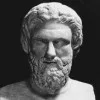HECUBA:O gods, spare me the sight
of this thankless breed, these politicians
who cringe for favors from a screaming mob
and do not care what harm they do their friends,
providing they can please a crowd![ἙΚΆΒΗ: ἀχάριστον ὑμῶν σπέρμ᾿, ὅσοι δημηγόρους
ζηλοῦτε τιμάς· μηδὲ γιγνώσκοισθέ μοι,
οἳ τοὺς φίλους βλάπτοντες οὐ φροντίζετε,
ἢν τοῖσι πολλοῖς πρὸς χάριν λέγητέ τι.]Euripides (485?-406? BC) Greek tragic dramatist
Hecuba [Hekabe; Ἑκάβη], l. 254ff (c. 424 BC) [tr. Arrowsmith (1958)]
(Source)
To Ulysses/Odysseus, whom she had spared when he entered Troy as a spy. After Troy's fall, she is enslaved to him, and he intends to have her daughter, Polyxdora, sacrificed to honor fallen Achilles, to appease his fellow Greek conquerors.
(Source (Greek)). Alternate translations:O ungrateful race
Of men, who aim at popular applause
By your smooth speeches; would to heav'n I ne'er
Had known you, for ye heed not how ye wound
Your friends, whene'er ye can say aught to win
The crowd.
[tr. Wodhull (1809)]Thankless is your race, as many of you as court honor from oratory before the populace; be ye not known to me, who care not to injure your friends, provided you say what is gratifying to the people.
[tr. Edwards (1826)]A thankful tribe you are, who fill your tongues
To popular grace; would I had never known you!
Of injuries to friends you reck not, if
Your fine speech wins the favour of the people.
[ed. Ramage (1864)]A thankless spawn, all ye that grasp at honour
By babbling to the mob! -- let me not know you,
Who injure friends, and nothing reck thereof,
So ye may something say to please the rabble!
[tr. Way (Loeb) (1894)]O thankless brood, who jostle to be called
The people's leaders, may I not even know you!
Who turn a phrase to catch the mob's applause,
And care not if your phrase destroy your friend.
[tr. Sheppard (1924)]A thankless race! all you who covet honor from the mob for your oratory. Oh that you were unknown to me! you who harm your friends and think no more of it, if you can say a word to win the mob.
[tr. Coleridge (1938)]May your breed turn their backs
On you and your like,
Smelling sweet up all men's noses.
You're no friend of mine.
Stay that way.
You shake the hands of all and sundry
Smiling as you spit
On your nearest and dearest
For the sake of pleasing everybody.
[tr. McGuinness (2004)]What a graceless breed you are, you demagogues, grubbing for favours from the mob. Spare me your friendship. You'd harm your friends if that would please the mob.
[tr. Harrison (2005)]Ah! All of you lot who are jealous of the honours received by political leaders are an ungrateful lot, the whole generation of you! I wish I had never known any of you. You don’t care how much you hurt your friends so long as you say something to pacify the masses.
[tr. Theodoridis (2007)]O gods save us from politicians and demagogues like you
who don’t care what harm you do as long as the multitudes
are pleased and the applause is loud.
[tr. Karden/Street (2011)]You are a thankless brood, you mob of wannabe
Politicians. I wish I didn’t know you
When you don’t care about harming your friends
As long as you say something the masses will like.
[tr. @sentantiq (2020)]
Quotations about:
demagogue
Note not all quotations have been tagged, so Search may find additional quotes on this topic.
The man who, if born to wealth and power, exploits and ruins his less fortunate brethren is at heart the same as the greedy and violent demagogue who excites those who have not property to plunder those who have.
Theodore Roosevelt (1858-1919) American politician, statesman, conservationist, writer, US President (1901-1909)
Speech (1910-04-23), “Citizenship in a Republic [The Man in the Arena],” Sorbonne, Paris
(Source)
Of one man in especial, beyond any one else, the citizens of a republic should beware, and that is of the man who appeals to them to support him on the ground that he is hostile to other citizens of the republic, that he will secure for those who elect him, in one shape or another, profit at the expense of other citizens of the republic. It makes no difference whether he appeals to class hatred or class interest, to religious or anti-religious prejudice. The man who makes such an appeal should always be presumed to make it for the sake of furthering his own interest.
Theodore Roosevelt (1858-1919) American politician, statesman, conservationist, writer, US President (1901-1909)
Speech (1910-04-23), “Citizenship in a Republic [The Man in the Arena],” Sorbonne, Paris
(Source)
Nor need we be surprised that men so often embrace almost any doctrines, if they are proclaimed with a voice of absolute assurance. In a universe that we do not understand, but with which we must in one way or another somehow manage to deal; and aware of the conflicting desires that clamorously beset us, between which we must choose, and which we must therefore manage to weigh, we turn in our bewilderment to those who tell us that they have found a path out of the thickets and possess the scales by which to appraise our needs. Over and over again such prophets succeed in converting us to unquestioning acceptance; there is scarcely a monstrous belief that has not had its day and its passionate adherents, so eager are we for safe footholds in our dubious course.
Learned Hand (1872-1961) American jurist
Speech (1955-01-29), “A Fanfare for Prometheus,” American Jewish Committee annual dinner, New York City
(Source)
The conservatives nearly always tolerate the demagogue while he is destroying liberals. The conservatives may even know that their turn will come next, but they usually take this calculated risk. “Let him knock their heads together,” they say, “we’ll take care of him in good time.” […] But it never works out the way the conservatives would like to have it, especially if the demagogue knows how to consolidate his position before he finally goes after his early “allies.”
Harry Golden (1902-1981) Austrian-American writer and newspaper publisher [b. Herschel Goldhirsch]
“The Death of Senator McCarthy,” Carolina Israelite (5 May 1957)
(Source)
Reprinted in Only in America (1958).
O ay, you’re like the fisher-folk, the men who hunt for eels,
Who when the mere is still and clear catch nothing for their creels,
But when they rout the mud about and stir it up and down,
‘Tis then they do; and so do you when you perturb the town.[ὅπερ γὰρ οἱ τὰς ἐγχέλεις θηρώμενοι πέπονθας.
ὅταν μὲν ἡ λίμνη καταστῇ, λαμβάνουσιν οὐδέν·
ἐὰν δ᾽ ἄνω τε καὶ κάτω τὸν βόρβορον κυκῶσιν,
αἱροῦσι· καὶ σὺ λαμβάνεις, ἢν τὴν πόλιν ταράττῃς.]Aristophanes (c. 450-c. 388 BC) Athenian comedic playwright
The Knights [Ἱππεῖς], ll. 864-67 [Sausage Seller] (424 BC) [tr. Rogers (1924)]
(Source)
Speaking of demagogues like Paphlagonian (Cleon).
Alt. trans.:
- "You are like the fishers for eels; in still waters they catch nothing, but if they thoroughly stir up the slime, their fishing is good; in the same way it's only in troublous times that you line your pockets." [tr. O'Neill (1938)]
- "For you are circumstanced like those who fish for eels. When the lake is still, they catch nothing; but if they stir the mud up and down, they take. And you catch, if you disturb the city." [tr. Hickie (1853)]
Indeed, just as frightened horses raise their necks up high, in the same way all those devotees of empty glory raise themselves above everything else, above cities, laws, ancestral custom, and the affairs of individual citizens. As they move from demagoguery to dictatorship, they subdue some of their neighbors as they try to make themselves superior and upright — and then they plan to enslave however so many minds remain naturally free and unenslaved.
[τῷ γὰρ ὄντι καθάπερ οἱ γαῦροι τῶν ἵππων τὸν αὐχένα μετέωρον ἐξάραντες, ὅσοι θιασῶται τῆς κενῆς δόξης εἰσίν, ἐπάνω πάντων ἑαυτοὺς ἱδρύουσι, πόλεων, νόμων, ἐθῶν πατρίων, τῶν παρ᾿ ἑκάστοις πραγμάτων· εἶτα ἀπὸ δημαγωγίας ἐπὶ δημαρχίαν βαδίζοντες καὶ τὰ μὲν τῶν πλησίον καταβάλλοντες, τὰ δὲ οἰκεῖα διανιστάντες καὶ παγίως ὀρθοῦντες, ὅσα ἐλεύθερα καὶ ἀδούλωτα φύσει φρονήματα]
Philo of Alexandria (AD c. 20-50) Hellenistic Jewish philosopher [Philo Judaeus]
On Dreams, That They Are God-Sent [Quod a Deo Mittantur Somnia or De Somniis], Book 2, ch. 12 [2.78-79] [tr. @sentantiq]
(Source)
Alt. trans.: "In real truth, as spirited horses lift their necks high, so all who are companions of vain opinion place themselves above all things, above all cities, and laws, and national customs, and above all the circumstances which affect each individual of them. Then proceeding onwards from being demagogues to being leaders of the people, and overthrowing the things which belong to their neighbours, and setting up and establishing on a solid footing what belongs to themselves, that is to say, all such dispositions as are free and by nature impatient of slavery, they attempt to reduce these also under their power." [Yonge (1855)]
DEMOSTHENES: A demagogue must be neither an educated nor an honest man; he has to be an ignoramus and a rogue.
America’s two great specialties are demagogues and rock and roll, and we’ve all heard plenty of both in our time.









